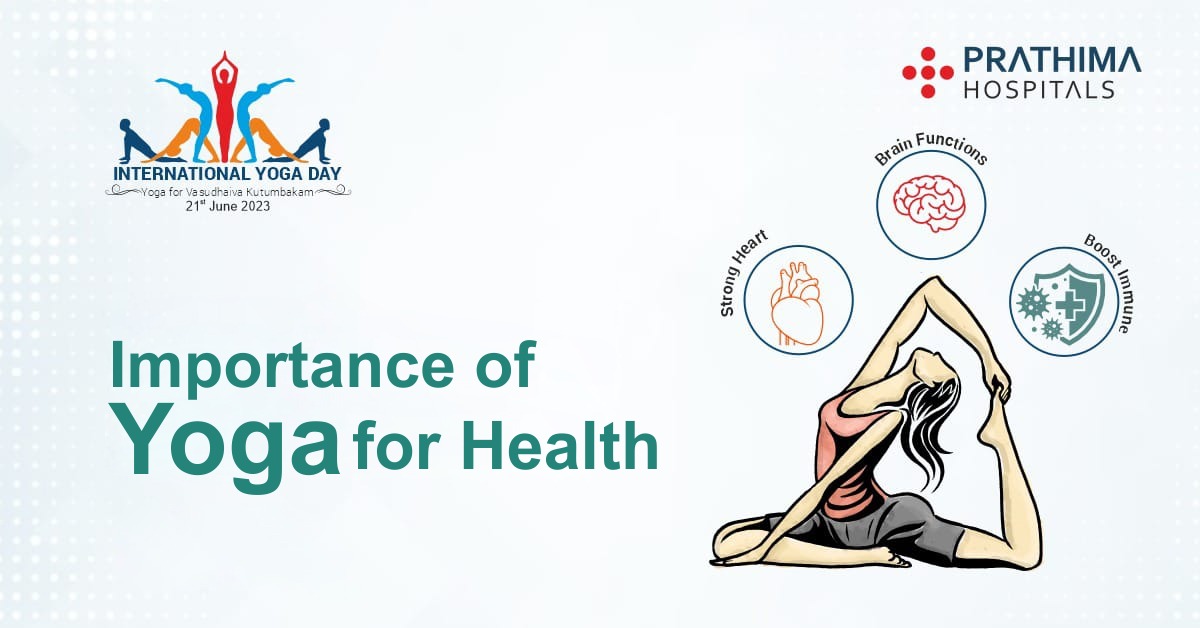Significance of Yoga for Health

Benefits of Yoga
Introduction:
The ancient practice of yoga has been gaining popularity in recent years and for good reason. Not only does it promote relaxation and stress reduction, but it also has a profound impact on our overall health and well-being said by General physician in Hyderabad. Yoga is not just a physical exercise; it is a holistic practice that integrates the mind, body, and spirit. Through a combination of physical postures, breathing techniques, and meditation, yoga can improve the functioning of our organs and contribute to optimal health.
Benefits of Yoga for Cardiovascular System:
According to Cardiologist in Kukatpally, one of the primary ways that yoga impacts our health is through its positive effects on our cardiovascular system. Regular practice of yoga has been shown to lower blood pressure and reduce the risk of heart disease. The physical postures, known as “asanas” increase blood flow to the heart and improve the efficiency of the cardiovascular system. In addition, yoga promotes relaxation and stress reduction, which further supports cardiovascular health. By reducing stress and improving blood circulation, yoga can help prevent heart attacks and strokes and improve overall cardiovascular fitness.
Respiratory System:
Yoga also has a significant impact on our respiratory system. The practice of deep breathing exercises, known as pranayama, can strengthen the respiratory muscles and improve lung function as per Pulmonologist in Hyderabad. This is particularly beneficial for individuals with respiratory conditions such as asthma or chronic obstructive pulmonary disease (COPD). Yoga helps to expand lung capacity, enhances oxygen intake, and improves the overall efficiency of the respiratory system. As a result, practitioners experience improved breathing patterns, increased energy levels, and a reduced risk of respiratory ailments.
Digestive System:
The digestive system is another area where yoga can have a positive impact. Many yoga postures involve twisting and stretching movements that massage the internal organs, including the stomach, intestines, and liver. According to Gastroenterologist in KPHB, these movements help to stimulate digestion and improve the absorption of nutrients. Yoga also helps to reduce stress, which is known to negatively affect digestion. By promoting relaxation and proper digestion, yoga can alleviate common digestive problems such as bloating, constipation, and indigestion. There are many benefits with yoga, It can also help to maintain a healthy weight, as a regular practice of yoga increases mindfulness and awareness of our eating habits.
Immune System:
Our immune system plays a crucial role in protecting us from infections and diseases. Yoga has been found to boost the immune system by reducing stress and promoting a state of balance and harmony in the body. Chronic stress weakens the immune system, making us more susceptible to illness. As suggested by the General Physician in Kukatpally, through the practice of yoga, we can activate the relaxation response, which reduces stress hormones and supports immune function. Yoga also stimulates the lymphatic system, which is responsible for removing toxins from the body and enhancing immunity. By strengthening the immune system, yoga helps us stay healthy and ward off illnesses.
Nervous System:
Another organ that benefits greatly from yoga is the brain. The practice of yoga involves mindfulness and meditation, which have been shown to improve cognitive function and mental clarity. As per Neurologist in Kachiguda, Yoga helps to calm the mind, reduce anxiety, and enhance focus and concentration. It also increases the production of neurotransmitters such as serotonin, which is responsible for feelings of well-being and happiness. Regular yoga practice has been associated with improved memory, increased brain volume, and a reduced risk of neurodegenerative diseases such as Alzheimer’s. By promoting brain health, yoga contributes to overall mental well-being and can even slow down the ageing process of the brain.
Endocrine System:
The endocrine system, which consists of glands that secrete hormones, is also positively influenced by yoga. Many yoga poses stimulate the thyroid gland, which regulates metabolism and energy levels. By practising specific asanas that target the thyroid gland, such as shoulder stand and fish pose, we can improve thyroid function and balance hormone levels. Yoga also helps to regulate the stress hormone cortisol, which is produced by the adrenal glands. High levels of cortisol can lead to weight gain, impaired immune function, and other health issues. Through yoga, we can reduce cortisol levels and promote hormonal balance, leading to improved overall health.
Musculoskeletal system:
Lastly, yoga has a profound impact on our musculoskeletal system. According to General Physician in Kachiguda, the practice of yoga postures helps to strengthen and tone muscles, increase flexibility, and improve posture. It also enhances joint mobility and reduces the risk of injuries. Yoga is particularly beneficial for individuals with chronic pain conditions such as back pain or arthritis. The gentle stretching and strengthening movements in yoga can alleviate pain, increase the range of motion, and improve overall musculoskeletal health. By promoting a strong and flexible body, yoga enables us to move with ease and prevent age-related muscle and joint problems.
In conclusion, the practice of yoga offers numerous benefits for our health and well-being. By integrating the mind, body, and spirit, yoga has a holistic impact on our organs and systems. From improving cardiovascular health to enhancing brain function, boosting the immune system, and promoting optimal digestion, yoga has the power to transform our overall health. Whether you are a beginner or an advanced practitioner, incorporating yoga into your daily routine can have profound and long-lasting effects on your well-being. So spread out your mat and begin enjoying the advantages of this age-old practice right away!
.
.
.
.
.
For more details :
📞:: 733 733 6600 | 040 4345 4345
🌐:: https://prathimahospitals.com/book-appointment/



